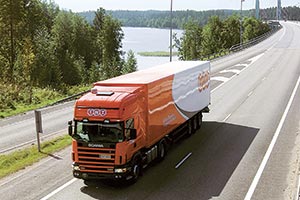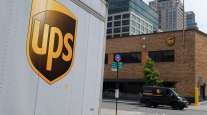UPS Asks European Court to Reverse Ruling That Blocked Its Acquisition of TNT Express

This story appears in the April 18 print edition of Transport Topics.
UPS Inc. signaled its continued interest in Hoofddorp, Netherlands- based package and freight carrier TNT Express — currently pledged to a merger with FedEx Corp. — by asking a European Union court to reverse a 2013 regulatory ruling that blocked UPS from acquiring TNT.
UPS is asking the General Court of the European Union, based in Luxembourg, to undo the 2013 decision by the European Commission’s competition bureau. The agency ruled that the combination of the second- and third-largest package carriers in Europe would be harmful to competition after UPS offered $6.8 billion for TNT.
Two years after that action that scuttled the UPS effort to buy TNT, FedEx offered 9 euros per share, or $4.9 billion, for TNT, a marginally profitable company, in a bid to boost the U.S. company’s presence in Europe and Asia. FedEx, based in Memphis, Tennessee, and the fourth-largest package carrier in Europe, won approval from the EC to combine with No. 3 TNT.
The court action by Atlanta-based UPS comes as FedEx and TNT are in the final stages of receiving regulatory approvals from government agencies in dozens of countries — which they intend to complete in the first half of the year.
FedEx spokeswoman Erin Truxal said to Transport Topics last week, “The proposed acquisition by FedEx of TNT Express is unaffected by this [court] proceeding and remains on track. We continue to work constructively with the required regulatory authorities.”
Among major countries, only China is yet to rule on the FedEx- TNT linkup.
“This is a last-ditch effort,” said Kevin Sterling, a BB&T Capital Markets analyst who follows both companies. “UPS is doing everything it can to make life difficult for FedEx.”
Sterling told TT that DHL Express, the largest package carrier in Europe and a unit of Germany’s Deutsche Post AG, actively opposed the UPS-TNT deal because that combination would have given UPS a market share equal to DHL. On the other hand, there was no DHL complaint about the combination of FedEx and TNT, which Sterling termed “pretty much a done deal” that would make those two companies about the same size in Europe’s package market as UPS.
“The commission committed an error of law and a manifest error of assessment when examining the likely price effects of the [UPS-TNT] concentration,” the UPS filing said in the Official Journal of Europe’s governing body, disputing a series of arguments made by the EC.
UPS maintained that the EC changed UPS data relating to economics of its TNT proposal without giving the U.S. company a chance to explain or rebut the changes. UPS also argued that the EC’s analysis didn’t provide evidence of effective pricing power.
UPS also claimed that the EC “committed manifest error of assessment when it concluded that competitors who are not close competitors could not expand to constrain effectively the merged entity in the foreseeable future.”
Glenn Zaccrara, spokesman at UPS, which is No. 1 on the Transport Topics Top 100 list of the largest U.S. and Canadian for-hire carriers, declined to elaborate on the European filing.
TNT returned to profitability in the fourth quarter after a series of losses. Neither FedEx, No. 2 on the for-hire TT100, nor TNT have disclosed details about the financial and operational benefits of the deal.
The European Commission’s approval of FedEx and TNT’s combination was unconditional. FedEx and TNT initially announced they would sell TNT’s airline, whose plane fleet is about 10 times smaller than FedEx’s.
Sterling also noted that perhaps UPS was hoping the European court would take a cue from the U.S. Department of Justice, which earlier this month rejected a combination of oil-field services companies Halliburton and Baker Hughes.




